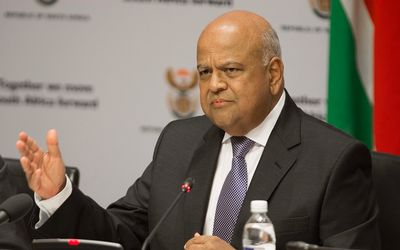IF FINANCE Minister Pravin Gordhan’s political and personal credibility hinge on anything, it is whether his 2016-17 budget, which he delivered yesterday, adequately responds to the challenges facing the country. On the face of it, he has delivered, at least in making the right promises.
Fiscal consolidation by curtailing expenditure and borrowing, structural reforms and finding stimulus for growth in high-potential sectors, were the three interventions analysts agreed could help avert a credit rating downgrade. The budget responds to all. What remains to be seen is a willingness to implement all three as rapidly as possible.
There is no stronger message than cutting the budget deficit to 2.4%, lower than what was proposed in the medium-term budget policy statement. It is a tough measure that explains the extent to which the possibility of a collapse in fiscal credibility has spooked the African National Congress (ANC).
While Mr Gordhan’s budget will go a long way towards changing SA’s fiscal narrative from negative and uncertain to positive, the country still faces a conundrum in that it cannot easily fire up the economy to grow rapidly in the short term.
Nonetheless, the budget recognises that sectors hitherto treated with relative neglect in terms of allocation need more serious attention.
Tourism, agriculture and agriprocessing move closer to the centre stage, as do post-school funding and skills training. Tax revenues are lower than initially anticipated due to lower corporate and personal income taxes, so the tax increases were inevitable. Even then, they appear to be sufficiently moderate not to cause damage to growth, which is expected to be 0.9% next year, according to the Treasury.
It is worth noting, however, that both the Treasury and the Reserve Bank have tended to overestimate growth in the past six to seven years. This is due in part to political and related factors that are difficult for forecasters to predict. The damaging dismissal of Nhlanhla Nene as finance minister last December is one such instance.
As clear-eyed as Mr Gordhan’s budget is, the big elephant in the room is political will. If these budget plans are to succeed, it is critical for the president and all influential figures and structures in the ANC to express their support for it openly. Mr Gordhan correctly pointed out that provinces and municipalities need strict monitoring of their expenditure, in particular overheads and intangible services such as conferences.
It is also worth noting that it was some of the ANC’s provincial power blocs that complained so bitterly about the Treasury’s perceived impenetrability that they rejoiced at the prospect of a weaker minister at the helm with the brief appointment of Des van Rooyen late last year. They are unlikely to ditch old habits, roll over and do Mr Gordhan’s bidding when they so detest the controls Treasury already has in place, let alone new ones.
Mr Gordhan was correct in stating that the country can no longer spend money it does not have or borrow beyond its ability to repay.
This is the same message Mr Nene delivered to his Cabinet colleagues last December, just before he was dismissed. Mr Gordhan is unlikely to be dismissed, but it will take some time before his colleagues acclimatise to the new reality.
Ordinary South Africans are suffering under the strain of unemployment worsened by poor growth prospects. They are looking to the government to lead efforts to provide them with hope. It delegitimises our institutional edifice when public funds are wasted on political and ideological flights of fancy.
The savings proposed by Mr Gordhan deserve our collective support. It is also imperative that all sectors of South African society look for opportunities for collaboration to improve investment so that jobs can be created, and hopes realised.
The budget recognises that sectors hitherto treated with relative neglect … need more serious attention

Finance Minister Pravin Gordhan. Picture: TREVOR SAMSON
IF FINANCE Minister Pravin Gordhan’s political and personal credibility hinge on anything, it is whether his 2016-17 budget, which he delivered yesterday, adequately responds to the challenges facing the country. On the face of it, he has delivered, at least in making the right promises.
Fiscal consolidation by curtailing expenditure and borrowing, structural reforms and finding stimulus for growth in high-potential sectors, were the three interventions analysts agreed could help avert a credit rating downgrade. The budget responds to all. What remains to be seen is a willingness to implement all three as rapidly as possible.
There is no stronger message than cutting the budget deficit to 2.4%, lower than what was proposed in the medium-term budget policy statement. It is a tough measure that explains the extent to which the possibility of a collapse in fiscal credibility has spooked the African National Congress (ANC).
While Mr Gordhan’s budget will go a long way towards changing SA’s fiscal narrative from negative and uncertain to positive, the country still faces a conundrum in that it cannot easily fire up the economy to grow rapidly in the short term.
Nonetheless, the budget recognises that sectors hitherto treated with relative neglect in terms of allocation need more serious attention.
Tourism, agriculture and agriprocessing move closer to the centre stage, as do post-school funding and skills training. Tax revenues are lower than initially anticipated due to lower corporate and personal income taxes, so the tax increases were inevitable. Even then, they appear to be sufficiently moderate not to cause damage to growth, which is expected to be 0.9% next year, according to the Treasury.
It is worth noting, however, that both the Treasury and the Reserve Bank have tended to overestimate growth in the past six to seven years. This is due in part to political and related factors that are difficult for forecasters to predict. The damaging dismissal of Nhlanhla Nene as finance minister last December is one such instance.
As clear-eyed as Mr Gordhan’s budget is, the big elephant in the room is political will. If these budget plans are to succeed, it is critical for the president and all influential figures and structures in the ANC to express their support for it openly. Mr Gordhan correctly pointed out that provinces and municipalities need strict monitoring of their expenditure, in particular overheads and intangible services such as conferences.
It is also worth noting that it was some of the ANC’s provincial power blocs that complained so bitterly about the Treasury’s perceived impenetrability that they rejoiced at the prospect of a weaker minister at the helm with the brief appointment of Des van Rooyen late last year. They are unlikely to ditch old habits, roll over and do Mr Gordhan’s bidding when they so detest the controls Treasury already has in place, let alone new ones.
Mr Gordhan was correct in stating that the country can no longer spend money it does not have or borrow beyond its ability to repay.
This is the same message Mr Nene delivered to his Cabinet colleagues last December, just before he was dismissed. Mr Gordhan is unlikely to be dismissed, but it will take some time before his colleagues acclimatise to the new reality.
Ordinary South Africans are suffering under the strain of unemployment worsened by poor growth prospects. They are looking to the government to lead efforts to provide them with hope. It delegitimises our institutional edifice when public funds are wasted on political and ideological flights of fancy.
The savings proposed by Mr Gordhan deserve our collective support. It is also imperative that all sectors of South African society look for opportunities for collaboration to improve investment so that jobs can be created, and hopes realised.
The budget recognises that sectors hitherto treated with relative neglect … need more serious attention



















Change: 0.91%
Change: 0.81%
Change: 2.99%
Change: -0.19%
Change: 2.23%
Data supplied by Profile Data
Change: -0.27%
Change: 0.35%
Change: 0.91%
Change: 0.00%
Change: 0.09%
Data supplied by Profile Data
Change: -0.32%
Change: -0.29%
Change: -0.28%
Change: -0.37%
Change: 0.57%
Data supplied by Profile Data
Change: 0.55%
Change: 2.04%
Change: 0.64%
Change: 3.61%
Change: 4.08%
Data supplied by Profile Data